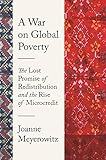A War on Global Poverty : The Lost Promise of Redistribution and the Rise of Microcredit / Joanne Meyerowitz.
Material type: TextPublisher: Princeton, NJ : Princeton University Press, [2021]Copyright date: ©2021Description: 1 online resource (328 p.) : 12 b/w illusContent type:
TextPublisher: Princeton, NJ : Princeton University Press, [2021]Copyright date: ©2021Description: 1 online resource (328 p.) : 12 b/w illusContent type: - 9780691219974
- Economic assistance
- Economic development
- Globalization -- Economic aspects
- Microfinance
- Poverty
- HISTORY / World
- Ananya Roy
- Eileen Boris
- Ford Foundation
- Global Development
- Inequality
- International Women’s Year
- Jocelyn Olcott
- Making the Woman Worker
- NGOs
- NIEO
- New International Economic Order
- Nick Cullather
- Poverty Capital
- Sara Lorenzini
- Sorting Out the Mixed Economy
- The Hungry World
- U.S. history
- USAID
- World Bank
- antipoverty movement
- business development
- debt
- development economics
- economic history
- famine
- foreign aid
- gender
- global South
- globalization
- hunger
- microfinance
- trickle-down economics
- women’s empowerment
- women’s history
- online - DeGruyter
| Item type | Current library | Call number | URL | Status | Notes | Barcode | |
|---|---|---|---|---|---|---|---|
 eBook
eBook
|
Biblioteca "Angelicum" Pont. Univ. S.Tommaso d'Aquino Nuvola online | online - DeGruyter (Browse shelf(Opens below)) | Online access | Not for loan (Accesso limitato) | Accesso per gli utenti autorizzati / Access for authorized users | (dgr)9780691219974 |
Browsing Biblioteca "Angelicum" Pont. Univ. S.Tommaso d'Aquino shelves, Shelving location: Nuvola online Close shelf browser (Hides shelf browser)

|

|

|

|

|

|

|
||
| online - DeGruyter Maria Theresa : The Habsburg Empress in Her Time / | online - DeGruyter The Last Embassy : The Dutch Mission of 1795 and the Forgotten History of Western Encounters with China / | online - DeGruyter The Imam of the Christians : The World of Dionysius of Tel-Mahre, c. 750–850 / | online - DeGruyter A War on Global Poverty : The Lost Promise of Redistribution and the Rise of Microcredit / | online - DeGruyter When Bad Thinking Happens to Good People : How Philosophy Can Save Us from Ourselves / | online - DeGruyter Alternative Conceptions of Civil Society / | online - DeGruyter Greed and Injustice in Classical Athens / |
Frontmatter -- Contents -- List of Abbreviations -- Introduction: From Modernization to Microcredit -- Part I. A War on Global Poverty -- Chapter One. The Trouble with Foreign Aid -- Chapter Two. Redistribution -- Part II. How Women Became the Deserving Poor -- Chapter Three. Developing Women -- Chapter Four. Private Developments -- Part III. The Microcredit Moment -- Chapter Five. Macro Debt and Microcredit -- Epilogue. The Development of Poverty -- Acknowledgments -- Notes -- Index -- A Note On The Type
restricted access online access with authorization star
http://purl.org/coar/access_right/c_16ec
A history of U.S. involvement in late twentieth-century campaigns against global poverty and how they came to focus on women A War on Global Poverty provides a fresh account of U.S. involvement in campaigns to end global poverty in the 1970s and 1980s. From the decline of modernization programs to the rise of microcredit, Joanne Meyerowitz looks beyond familiar histories of development and explains why antipoverty programs increasingly focused on women as the deserving poor.When the United States joined the war on global poverty, economists, policymakers, and activists asked how to change a world in which millions lived in need. Moved to the left by socialists, social democrats, and religious humanists, they rejected the notion that economic growth would trickle down to the poor, and they proposed programs to redress inequities between and within nations. In an emerging “women in development” movement, they positioned women as economic actors who could help lift families and nations out of destitution. In the more conservative 1980s, the war on global poverty turned decisively toward market-based projects in the private sector. Development experts and antipoverty advocates recast women as entrepreneurs and imagined microcredit—with its tiny loans—as a grassroots solution. Meyerowitz shows that at the very moment when the overextension of credit left poorer nations bankrupt, loans to impoverished women came to replace more ambitious proposals that aimed at redistribution. Based on a wealth of sources, A War on Global Poverty looks at a critical transformation in antipoverty efforts in the late twentieth century and points to its legacies today.
Mode of access: Internet via World Wide Web.
In English.
Description based on online resource; title from PDF title page (publisher's Web site, viewed 01. Dez 2022)


